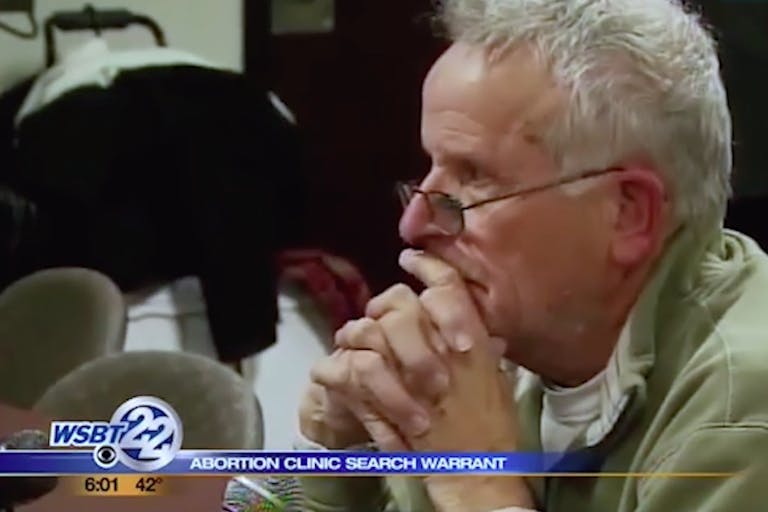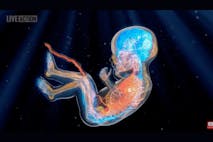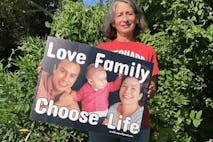
‘Miracle Baby’: Couple welcomes baby girl via restorative reproductive medicine
Isabella Childs
·
‘Inwood Drive’ documentary features recorded interview with abortionist who kept 2,411 aborted bodies
“Inwood Drive” is a new documentary produced by Mark and Amber Archer of Fearless Features, currently available for viewing by clicking here. The film gives more detailed insight into late abortionist Ulrich “George” Klopfer, whose notorious abortion businesses in Indiana became the subject of nationwide headlines after authorities found 2,411 aborted babies’ bodies at his Illinois home and in the trunk of one of his cars.
The film tells the story of the fight to shut down Klopfer’s businesses in Indiana from various perspectives — from the experiences of a pastor, local lawmakers, local pro-life groups, doctors, and more. But what is most striking is that the film features audio from an interview between the film’s producers and Klopfer himself, ten months before his death in the fall of 2019. It is the only personal interview ever recorded with Klopfer.
The film begins by discussing how one church in Fort Wayne, Indiana, felt compelled to become involved in the fight against abortion when they learned that Klopfer’s abortion business was going to be located very near their property. The film’s name, “Inwood Drive,” is named after the location of one of Klopfer’s facilities, which he occupied after Indiana passed a law requiring certain safety rules for abortion facilities. The rules stipulated that abortion businesses already in operation and seeing at least five patients before a certain date did not have to adhere to any of the new structural safety regulations. The building on Inwood Drive was also advantageous for Klopfer because it had its own parking lot, and made it much more difficult for sidewalk counselors to reach abortion-minded women.
Featured in the documentary is Dr. Geoffrey Cly, who explains why he — a pro-life OB/GYN — eventually became Klopfer’s backup physician. Cly was seeing patient after patient coming to the emergency room suffering complications from botched abortions, many of which were caused by itinerant abortionists who had no admitting privileges in the Fort Wayne area. A local patient safety ordinance finally passed after several years of trying, requiring doctors to have a backup physician. But Klopfer struggled to find one, and claimed that due to this, he would be shut down. The ACLU and Center for Reproductive Rights stepped in to represent Klopfer. Had Dr. Cly not offered himself as a backup physician, the ordinance would likely not have been allowed to stand at all, meaning women would have continued being injured by abortionists who weren’t being held accountable.
Producer Mark Archer notes in the film, “Geoff Cly had stepped up and saved the ordinance by offering himself as the backup physician. In the short term, that did allow Klopfer to keep performing abortions in Allen County. But what was really happening in the background was that the foundation had been laid for what would very soon bring down George Klopfer.”
About halfway through the film, viewers hear Klopfer discussing his multiple justifications for committing abortions. Klopfer was found to have committed abortions on underage girls — victims of statutory rape — and neglecting to report them to authorities. This caused Dr. Cly to step down as his backup physician, and eventually, Klopfer was stripped of his license because of what he deemed to be a clerical error. “It was down to paperwork,” Klopfer claimed, insisting he had never lost a patient. “Either I was lucky, or I was doing something right.”
READ: Tragic: Aborted children found in Indiana abortionist’s home unable to be identified
Allen County Right to Life Executive Director Cathie Humbarger states in the film that she was in room the day the medical licensing board had a hearing to consider revoking Klopfer’s license. She says, “When the issue of underage abortions came up, he said that he thought it was perfectly fine… to send girls to other states where the laws weren’t as tight on reporting abortions…. He readily admitted in front of [the board] that he thought it was the best practice of a doctor to return an underage girl to her family without reporting because that was a family matter…. It was amazing to see the looks on their faces… .‘Do you really mean that you shouldn’t report this child abuse?’ and he insisted that he thought that was best medical practice….” That, she says, was the main reason why Klopfer lost his license.
The documentary also includes commentary from Indiana Attorney General Curtis Hill, who remarked on the shocking discovery of the remains of aborted children among Klopfer’s personal items. “It’s hard to shock me anymore, but this is close,” he states. “It was unheard of…. People from both sides of the abortion debate… were coming to the same conclusion, that this was beyond the pale….” The film ends with AG Hill’s remarks in remembrance of the 2,411 preborn children found in Klopfer’s garage and car as they were laid to rest at a burial service in Indiana.
For those who want to know more details about the story of abortionist Ulrich “George” Klopfer — and many of the key community figures involved in the effort to end the slaughter of women and preborn babies from the beginning of Klopfer’s abortion practice in Indiana — “Inwood Drive” is a film worth watching.
“Like” Live Action News on Facebook for more pro-life news and commentary!
Live Action News is pro-life news and commentary from a pro-life perspective.
Contact editor@liveaction.org for questions, corrections, or if you are seeking permission to reprint any Live Action News content.
Guest Articles: To submit a guest article to Live Action News, email editor@liveaction.org with an attached Word document of 800-1000 words. Please also attach any photos relevant to your submission if applicable. If your submission is accepted for publication, you will be notified within three weeks. Guest articles are not compensated (see our Open License Agreement). Thank you for your interest in Live Action News!

Isabella Childs
·
Human Interest
Bridget Sielicki
·
Media
Nancy Flanders
·
Media
Kelli Keane
·
Media
Cassy Cooke
·
Media
Cassy Cooke
·
Media
Kelli Keane
·
Human Interest
Kelli Keane
·
Activism
Kelli Keane
·
Politics
Kelli Keane
·
Human Interest
Kelli Keane
·